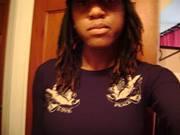Categories
Tags
-
#black people
#black
#Racist Caucasians
#White Supremacy
#Black Revolution
#White People
#Black Facts
#Martin Luther King Jr
#education
#Afrikan
#blacks hating blacks
#blacks selling out blacks
#racist catholics
#race
#morals
Archives
DONATE TO KEEP THE MOVEMENT GOING
Ruby Bridges: African-American activist
-
Ruby Bridges was born on September 8, 1954. She is an African-American activist.
Bridges was born in a little cabin around Tylerton, Mississippi to a very poor family. Her father, Abon, and mother, Lucille, were determined to get their daughter an education and take a stand. Because of their forthright and courageous actions, her father was fired from his job, and her grandparents were forced toleave a farm where they had been sharecroppers for 25 years.
Ruby Bridges did not know what it meant and wondered why white adults were trying to keep her from an education. Through it all, her parents walked beside her to the school, holding her hand, knowing how this would benefit their children and children in the future.
Although many consider Bridges a hero, for her, the real heroes are her parents. She clearly remembers the white federal marshals, with bands around their arms, escorting her that day from her car and into the building. It was Ruby's first day as a first-grader at William Frantz School. She spent most of the day in the principal's office. When she entered her new classroom, there were no students and she thought that she was early. What had happened was the white parents had taken their children out of school that day.
The pain six-year-old Ruby experienced 37 years ago she still feels as a grown-up. According to Bridges, 37 years ago, fate led her to the job of improving the quality of education for all Black children.
Bridges reaches out to parents and encourages them to take an active part in their children's education. She tries to make them understand that education has no limitations. She stresses moral responsibility to one another regardless of the color of skin. She tries to improve the social, economic, and political status of children, no matter what color, and to do all she can to ensure a better life for children--and adults.
Bridges, now Ruby Bridges Hall, still lives in New Orleans. For 15 years she worked as a travel agent, later becoming a full-time parent to her four sons. She is now chair of the Ruby Bridges Foundation, which she formed in 1999 to promote "the values of tolerance, respect, and appreciation of all differences". Her parents later divorced. Describing the mission of the group, she says, "racism is a grown-up disease and we must stop using our children to spread it."
In 1993 Bridges Hall began looking after her recently orphaned nieces, then attending William Frantz Elementary as their aunt had before them. She began to volunteer as a parent liaison three days a week. Eventually, publicity related to Coles' children's book caused reporters to track down Bridges Hall and write stories about her volunteer work at the school, which in turn led to a reunion with teacher Henry. Henry and Bridges Hall now sometimes make joint appearances in schools in connection with the Bridges Foundation.
Bridges was the subject of the Lori McKenna song "Ruby's Shoes." Bridges’ childhood struggle at William Frantz Elementary School was portrayed in the 1998 made-for-TV movie Ruby Bridges. In 2001, Bridges was awarded the Presidential Citizens Medal by President Bill Clinton. Bridges lost her home during Hurricane Katrina in 2005. In 2006, the city of Alameda Unified School District dedicated a new elementary school to Ruby Bridges, and issued a proclamation in her honor. She was also honored in the Anti-Defamation League's Concert Against Hate that same year. In 2007 the Children's Museum of Indianapolis unveiled a new exhibit documenting Bridges' life, along with the lives of Anne Frank and Ryan White.
Reference:
The African-American Atlas
Black History & Culture: An Illustrated Reference
by Molefi K. Asanta and Mark T. MattsonRuby Bridges was born on this date in 1954. She is an African-American activist.



No Stickers to Show